|
IRB Rugby World Cup
'That's just France -- they came out of nowhere'
Tom Hamilton
October 15, 2015
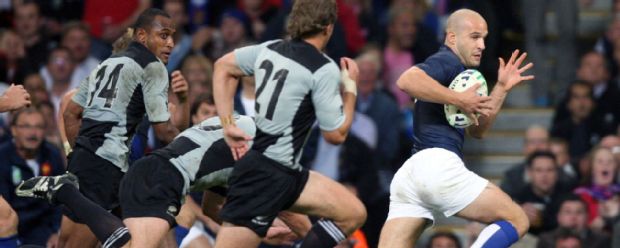 Frederic Michalak© WILLIAM WEST/AFP/Getty Images The great All Blacks centre Frank Bunce pauses as he tries to weigh up the depth of New Zealand's rivalry with France. It is one that is geographically nonsensical but at the back of All Blacks' supporters minds, there is a lingering dread whenever they face Les Bleus; it is a fear of the unknown, the Gallic unpredictability. "The rivalry unsettles the All Blacks supporters," Bunce -- who lost three of four meetings against France as an All Black -- told ESPN. "In the past the French have risen to the occasion and beaten us when all seems lost. The unpredictability is the issue, the worry for us. "It is a rivalry that gets fiercer at World Cup time. We've been disappointed before. I wouldn't say people are worried -- the personnel are different -- but at the back of your mind, you worry about what France are going to do. You can't prepare for it ... you get the impression even they aren't really too sure what'll happen."
On Saturday evening, New Zealand will play France at Cardiff's Millennium Stadium in the quarterfinals of the Rugby World Cup. It is a carbon copy of the game brought New Zealand to a halt in 2007, when they suffered a shock 20-18 defeat. Minutes after the final whistle, All Blacks hooker Anton Oliver was asked what the atmosphere was like in the changing room. His response drew on the World War One literature he was reading at the time. "There's a sort of desolate decay and the smell of death," Oliver said. "That's what it feels like to us. It feels like no-man's land and it's not a nice place to be." Perhaps they only have themselves to blame. After the very first meeting between the sides in 1906 -- as part of a tour by 'The Originals', a team that has gone down in All Blacks history as the founding fathers of the All Blacks we know now -- New Zealand's Dave Gallaher made a prophetic statement. It is recorded in his and Billy Stead's book 'The Complete Rugby Footballer': "We are strongly of the opinion that the game will spread in their country and that in the course of time they will put a team in the field which will command the utmost respect of any other." Fast forward 80 years to the All Blacks' tour of France. Wayne 'Buck' Shelford made his debut on Nov. 8, 1986, scoring a try in a win against France in Toulouse. His second cap, in the return leg in Nantes a week later, reverberates to this day. The now infamous game, dubbed 'The Battle of Nantes', saw Shelford sustain gruesome injuries -- he lost four teeth and tore his scrotum. 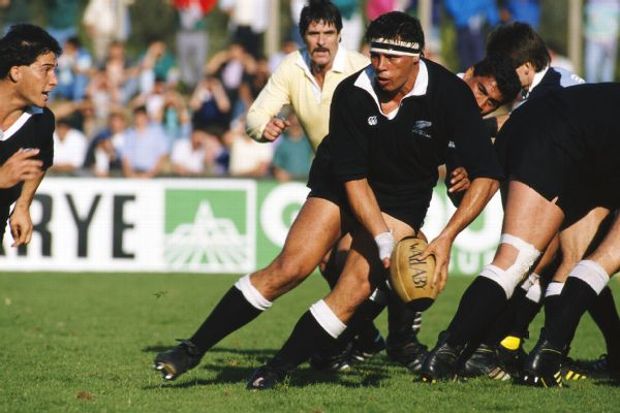 Wayne Shelford© Pascal Rondeau/Allsport/Getty Images
The match was revisited this year in Pierre Ballester's book 'Rugby à Charges' in which he claimed the French team were on amphetamines. The scars are still present on Shelford's torso, but he has blanked it from his memory -- partly because a knockout blow finished his match. "It was a tough game, probably the most violent game I've played in," Shelford told ESPN. "I don't remember the game at all. I only really remember the occurrence of damage that I got. I've never seen the game and I don't want to see it. They were so superior to the week before." A year later and the inaugural Rugby World Cup final pitted the All Blacks against France once again, this time on home turf, a game Shelford started as New Zealand won 29-9. The Nantes defeat triggered a run of 50 matches unbeaten for that New Zealand vintage but the matches against France still play on the great No.8's mind. "There was retribution in the way we played in the final but the memories of Nantes will linger," added Shelford. "We used the 1986 loss as ammunition to motivate ourselves." Their next World Cup meeting would be in the semifinals of the 1999 tournament. Three months before in June, France were hammered 54-7 in Wellington and, following a World Cup campaign where they were largely criticised for their form, they responded in the most brutal fashion against the widely-fancied All Blacks. 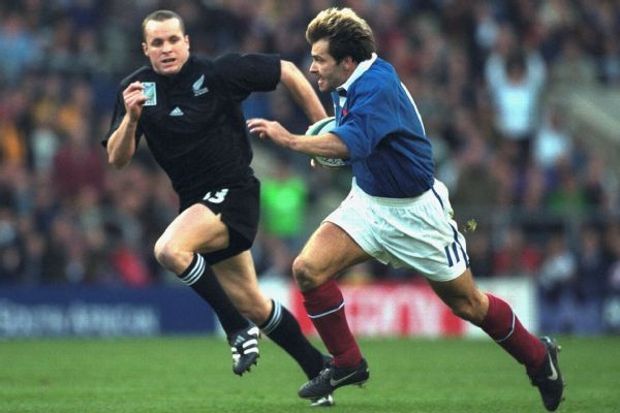 Christophe Dominici of France takes on Christian Cullen of New Zealand© Alex Livesey /Allsport Standing at fullback was Christian Cullen. After 44 minutes his New Zealand side led 24-10, only for France to pull off the mother of all upsets, winning 43-31. "We beat them convincingly and then six months on ... they put something on the field that we just couldn't deal with. It was unreal rugby," Cullen said. "We came off the field at half-time and everything was going well. And then France played well, they played smartly and it's one of those things in rugby. That's just France, they came out of nowhere." Pivotal to that win was Les Bleus' fullback Christophe Lamaison, who finished with a haul of 28 points. France's coach at the time, Jean-Claude Skrela, described his team as "strange" and that description seems brilliantly apt. Lamaison and his team-mates relished the underdogs title -- he himself was only included in the XV due to an injury to Thomas Castaignede -- and embraced their unpredictability.
"We spent the week trying to play down the mystique surrounding these All Black players, we told ourselves that for every 10 games they play, they often lose one!" Lamaison said. "It's true that in terms of sporting, physical and playing difference between the sides, there was nothing to indicate an upset and no guarantees for the fans or even our families. "Our aim was to not end up scoreless but despite the score when we were 24-10 down, we'd had some chances. We could sense the All Blacks weren't at their best and some were showing signs of nerves. The key for us was to score some points, penalties, drop goals, tries, and then the unexpected happened. The 1999 game traumatised them and they never got over it. Then it happened again in 2007, again in a World Cup!" The All Blacks have suffered 106 defeats in their Test history. Their 78.41 per cent winning record is an unparalleled story of success and one mapped on a rope. In James Kerr's 'Legacy', he tells of the All Blacks' 'Te Taura Tangata', the rope of mankind. It is a flax rope representing their genealogy with three interwoven strands of black, silver and red representing the heritage, the silver fern and their blood. There are other coloured strings of various shades woven into it with blue signifying a win over Argentina, white for England and so on but the black threads, 106 of them, represent the defeats. The ones symbolising 1999 and 2007 will cut deepest. 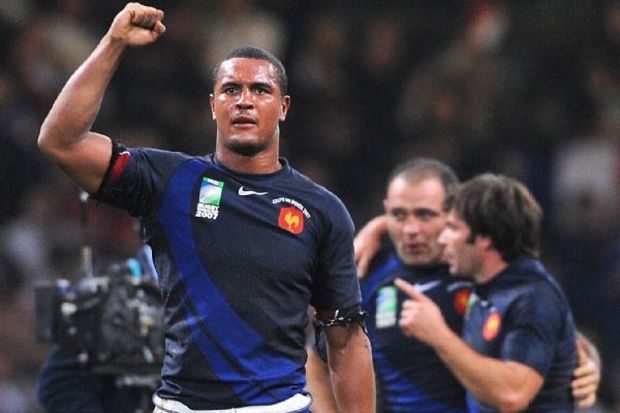 Thierry Dusautoir© MARTIN BUREAU/AFP/Getty Images An astonishing performance from Thierry Dusautoir helped France home in Cardiff in 2007 but the post-mortem focused on referee Wayne Barnes' decisions and the missed forward pass in the lead up to Yannick Jauzion's try. In his 2012 biography 'Final Word', Graham Henry revealed he felt France should have been penalised in the region of 40 times as opposed to the two occasions they were whistled. As Henry watched a replay of the match for the first time he was still gobsmacked over how they had lost with 73 per cent territory while making 258 tackles fewer than France. The experience of watching their 2007 funeral again led to impromptu vomiting.
At the time, the mood was of devastation as Oliver surmised by channelling Siegfried Sassoon. Henry's post-match comments also reflected it. "We will be scarred for the rest of our lives and I mean that," Henry said at the time. "We will always remember this." Four years on and they exorcised the demons with their win in the 2011 World Cup final, but they only beat France by a single point. France's unpredictability, which put a stop to their 1999 and 2007 tournaments, nearly reared its head again. "That's the French summed up. They can suffer two losses and then come within a point of winning the bloody thing," was Shelford's take on the 2011 edition of France and Brad Thorn -- who started in that final -- was blindingly aware of how close New Zealand came to falling short. "Everyone was writing them off, almost scornfully so," Thorn said. "They lost to Tonga and us in the round robin and then got stuck into the finals. They only just beat 14-man Wales so they were really -- after being written off -- at their most dangerous. When they're on, they're on. "For us it was almost like the final was against the Wallabies and getting up for that French game was all a little bit flat. They fought right to the end and we just got the result. The moment you drop your guard against the French, they come out and play." And that's what New Zealand can expect this weekend: a France team eager to put another black mark on the All Blacks' 'Te Taura Tangata'. The word from inside the camp this week is that parallels will not be drawn between Saturday's Test and the one eight years ago. "It's a new team and we are not looking in the past," said Dan Carter. "It is not daunting us. It was eight years ago and we have moved on from there with a new team who have been through a lot together. It's all about looking forward." But then comes the admission: "The thing is they are very unpredictable ... Form and momentum doesn't count for much with the French. They can be poor one week and awesome the next." 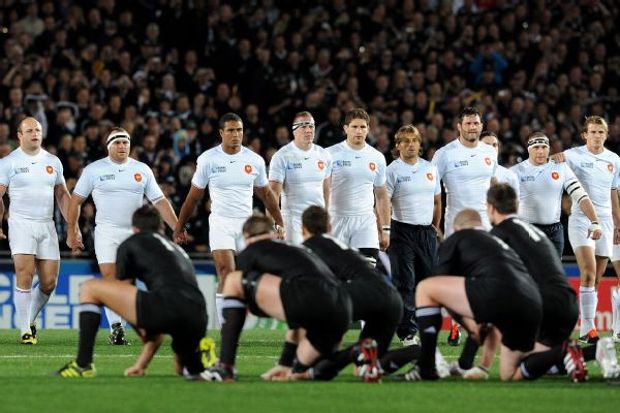 The French team advance to receive the challenge of the New Zealand All Black Haka© GABRIEL BOUYS/AFP/Getty Images They would never admit a fear of who they are playing, or at least trepidation, but the greats of yesteryear can relay that doubt. "Supporters in New Zealand worry the most about France," Cullen said. "This is a different kettle of fish, there's an edge about France. For New Zealand this is where the World Cup starts. "They are going back to Cardiff where it all happened but I doubt that'll be in their mind. Revenge is a dangerous emotion to use and I doubt that'll be spoken of. It's about the performance but you can't write off France, they love being the underdogs. When you get written off they perform better as they have nothing to lose." And that's where the fear comes from. Bunce said the 2007 quarterfinal has been the talk of the streets of New Zealand this week, it is the itch which cannot be scratched, but he was quietly confident. "It does play on the mind as it's [the defeats of 1999 and 2007] always there," Bunce said. "You know how unpredictable they are and as much as you prepare, they can surprise you. The worry is that you can't prepare for that level of unpredictability. "But the All Blacks will win. They won't want to go through all of that again. Even now in 2015 we are talking about 1999 and 2007. They won't want that carry on. As much as you say you can't prepare for them, the All Blacks will be ready." Cullen, Bunce and Shelford will all watch Saturday's game knowing what it feels like to be surprised by the French. Lamaison will also be keeping a close eye on the match. "I think the previous losses will be a source of motivation for the All Blacks and that they won't make the same mistakes," Lamaison said. "But they also know that the French players can dig deep and find some incredible resources." Thorn will be in the stadium as a face in the stand. His All Blacks career finished in the same way as Gallaher and the 1954 vintage, against France. He played seven times against Les Bleus, losing once, and even that great of both codes is wary of that tormenting unpredictability -- the fear of the unknown hovers over this match as do the ghosts of 1999 and 2007. "The French are made for situations like this, people write them off and they play a blinder," Thorn said. "They are unpredictable, they're always dangerous. "It's do or die now. They'll be coming with everything. Any opponent is dangerous once you get to the quarterfinal; it's three grand finals. If you don't win, you're gone. You have to respect your opponent and the occasion. Any team can get up on the day. There is no Monday, you have to earn the right to continue." © Tom Hamilton
|
Live Sports
Communication error please reload the page.
-
Football
-
Cricket
-
Rugby
-
- Days
- Hrs
- Mins
- Secs
F1 - Abu Dhabi GP
Abu Dhabi Grand Prix December 11-131. Max Verstappen ()
2. Valtteri Bottas (Mercedes)
3. Lewis Hamilton (Mercedes)
4. Alexander Albon ()
5. Lando Norris ()
6. Carlos Sainz Jr ()
-
ESPNOtherLive >>
Golf - Houston Open
Snooker - China Open
Tennis - Miami Open

